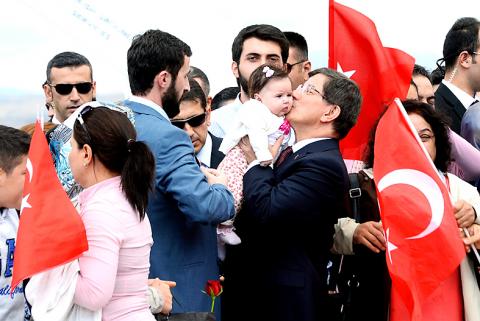Turkish intelligence agents brought 46 hostages seized by Islamic State (IS) militants in northern Iraq back to Turkey yesterday after more than three months in captivity, in what Turkish President Recep Tayyip Erdogan described as a covert rescue operation.
Security sources said the hostages had been released overnight in the town of Tel Abyad on the Syrian side of the border with Turkey, after being transferred from the eastern Syrian city of Raqqa, a stronghold of IS, formerly known as the Islamic State of Iraq and the Levant.
Officials declined to give details of the rescue operation.

Photo: EPA
The hostages, who included Turkey’s consul-general, diplomats’ children and special forces soldiers, were seized from the Turkish consulate in Mosul on June 11 during a lightning advance by the Sunni insurgents.
Family members rushed to the steps of the plane which brought the freed captives to the Turkish capital, Ankara, from the southern city of Sanliurfa, where they had earlier been welcomed by Turkish Prime Minister Ahmet Davutoglu.
Groups of supporters waved Turkish flags as Davutoglu hugged the consul-general and members of the diplomats’ families before addressing the crowd from the roof of a bus, saying the authorities had worked tirelessly for the hostages’ release.
“I thank the prime minister and his colleagues for the pre-planned, carefully calculated and secretly conducted operation throughout the night,” Erdogan said in a statement. “MIT [the Turkish intelligence agency] has followed the situation very sensitively and patiently since the beginning and, as a result, conducted a successful rescue operation.”
Speaking to reporters earlier in Azerbaijan before cutting short an official visit, Davutoglu declined to give details on the circumstances of the hostages’ release, saying only that it was carried out “through MIT’s own methods.”
Turkish officials had repeatedly said efforts were under way to secure their freedom and that the hostages were in good health, but had declined to comment further.
Three non-Turkish civilians who were taken in the same attack were also released in the operation yesterday, a foreign ministry official said.

NATIONAL SECURITY THREAT: An official said that Guan Guan’s comments had gone beyond the threshold of free speech, as she advocated for the destruction of the ROC China-born media influencer Guan Guan’s (關關) residency permit has been revoked for repeatedly posting pro-China content that threatens national security, the National Immigration Agency said yesterday. Guan Guan has said many controversial things in her videos posted to Douyin (抖音), including “the red flag will soon be painted all over Taiwan” and “Taiwan is an inseparable part of China,” while expressing hope for expedited “reunification.” The agency received multiple reports alleging that Guan Guan had advocated for armed reunification last year. After investigating, the agency last month issued a notice requiring her to appear and account for her actions. Guan Guan appeared as required,

Japan and the Philippines yesterday signed a defense pact that would allow the tax-free provision of ammunition, fuel, food and other necessities when their forces stage joint training to boost deterrence against China’s growing aggression in the region and to bolster their preparation for natural disasters. Japan has faced increasing political, trade and security tensions with China, which was angered by Japanese Prime Minister Sanae Takaichi’s remark that a Chinese attack on Taiwan would be a survival-threatening situation for Japan, triggering a military response. Japan and the Philippines have also had separate territorial conflicts with Beijing in the East and South China

A strong cold air mass is expected to arrive tonight, bringing a change in weather and a drop in temperature, the Central Weather Administration (CWA) said. The coldest time would be early on Thursday morning, with temperatures in some areas dipping as low as 8°C, it said. Daytime highs yesterday were 22°C to 24°C in northern and eastern Taiwan, and about 25°C to 28°C in the central and southern regions, it said. However, nighttime lows would dip to about 15°C to 16°C in central and northern Taiwan as well as the northeast, and 17°C to 19°C elsewhere, it said. Tropical Storm Nokaen, currently

PAPERS, PLEASE: The gang exploited the high value of the passports, selling them at inflated prices to Chinese buyers, who would treat them as ‘invisibility cloaks’ The Yilan District Court has handed four members of a syndicate prison terms ranging from one year and two months to two years and two months for their involvement in a scheme to purchase Taiwanese passports and resell them abroad at a massive markup. A Chinese human smuggling syndicate purchased Taiwanese passports through local criminal networks, exploiting the passports’ visa-free travel privileges to turn a profit of more than 20 times the original price, the court said. Such criminal organizations enable people to impersonate Taiwanese when entering and exiting Taiwan and other countries, undermining social order and the credibility of the nation’s